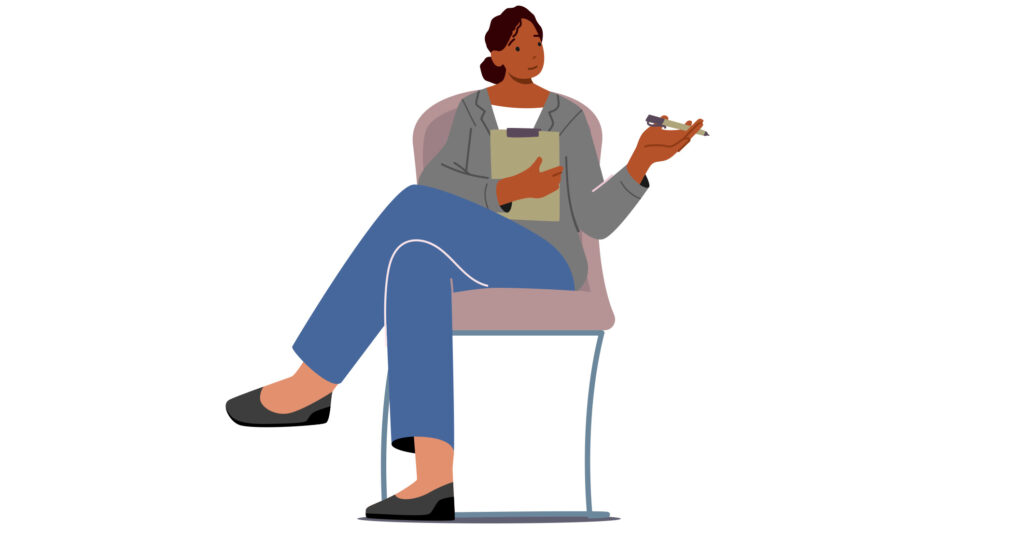The therapist selection process can feel intimidating, but it doesn’t have to be. Here’s a quick rundown of the steps to take and what to ask your therapist to ensure they’re the right one for you.
5 Steps for a Successful Therapist Selection Process
1. Set Expectations
Remind yourself that finding the right therapist will take time. Consider the selection process almost like dating. You don’t immediately click with every person you date, but when you find the right person, it can feel like magic.
The same can be true with therapists. Some counselors have personalities, working styles and therapy methods you don’t mesh with. And that’s okay. A 2022 study found the average American sees three therapists before they find a good match.
As long you set the expectation in the beginning that the therapist selection process takes time, you can save yourself from feeling disappointed or discouraged if a potential match doesn’t work out.
2. Identify Your Therapy Goals and Preferences
Before you ever talk to a therapist, it can be helpful to stop and reflect on what you’re hoping to achieve. Understand why you’re taking this step and what you want to address. Many therapists specialize in particular areas, such as addiction, eating disorders or PTSD. If you’re dealing with a specific problem, you may benefit from finding a therapist who’s highly experienced in this area.
Listing your goals also helps you understand what you want to accomplish with your counseling. This means you have explicit objectives when you start and you’ll be able to see clearly and quickly when a therapist doesn’t seem like the right fit to help you meet those goals.
Lastly, consider if you have any therapist preferences. You may want a therapist who has some of the following qualities:
- Identifies as the same gender as you
- Is somewhat close to you in age
- Offers telehealth appointments
- Has a certain amount of experience
- Is within a reasonable distance of your home or work
3. Research Potential Therapists
Research and list potential therapists in your area that meet your preferences. Make sure to:
- Take a look at online reviews.
- Call and ask about pricing.
- Confirm they accept your insurance.
Order the list from your top choice down. Then make your way down the list until you find the right match.
4. Prepare Questions for the Initial Consultation
Consider your first session like a counseling compatibility assessment. You’re coming in to see how compatible you are with this therapist.
To complete a comprehensive assessment that gives you a good understanding of how you feel about the therapist, you’ll need to prepare beforehand. Therapy can be emotionally taxing, so you can’t trust that you’ll simply walk out of the appointment with an accurate gut feeling about the therapist. After all, if you discuss heavy things, you may walk out a bit dazed and emotional.
Before your appointment, prepare a list of questions you want to ask your therapist. Feel free to share with them that you’re exploring options and are asking these questions to understand if they’re the right person to help you.
Some questions you may want to ask are:
- How long have you been practicing?
- Do you specialize in specific problems?
- What licenses and certifications do you have?
- Do you belong to any professional organizations?
- How much do you charge, and do you offer a sliding scale?
- How many clients have you had who have had similar problems to mine?
- What is your approach to therapy?
- What are your strengths and limitations as a counselor?
- What does a typical session look like?
- How long do you expect to see me for, and how often?
- What is your definition of success when helping a patient?
Remember that this is an opportunity for you to assess the therapist’s qualifications and approach to sessions. There are many styles of therapy, and it’s likely you won’t respond well to every type. Getting an understanding from the very beginning of how the therapist approaches sessions will allow you to decide if you’re compatible.
5. Reflect on the Consultation Experience
After your first session, jot down some notes about how you initially feel. As outlined above, these first feelings can be intertwined with feelings you may have regarding the topics you discussed. Give yourself a night to rest, wake up and reflect on the session. At this point, you should have a good indication if you want to return for a second session.
If you do give a therapist a shot, remember it doesn’t have to be forever. You can be with a therapist for 2 weeks, 2 months or even 2 years and move on to someone new. Therapy will only be effective if you work with someone you trust, feel comfortable with and believe has the skills to help you.
Find a Therapist Today
Now, all you have to do is begin your search. Luckily, Mental Health Hotline can help. Mental Health Hotline partners with reputable mental health providers nationwide to get you the help you need. There’s someone here for you 24-7; call today.


